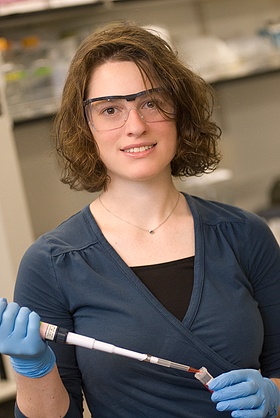May 24 2009
A Montana State University graduate student whose research has the potential to make a difference in how light is harvested for alternative energy applications has won a $90,000 fellowship from the National Science Foundation.
 Janice Lucon. MSU photo by Kelly Gorham.
Janice Lucon. MSU photo by Kelly Gorham.
Janice Lucon, 25, will receive an NSF annual stipend for three years to fund her research at MSU. She won the Graduate Research Fellowship based on her abilities, accomplishments, and potential to contribute to strengthening the vitality of science and engineering in the U.S., according to the NSF.
The 25-year-old, who grew up, in part, in northwest Montana's Flathead Valley, is working toward a doctorate in inorganic chemistry. Lucon works in professor Trevor Douglas' laboratory and said her research involves using protein cages to analyze platinum nanoparticles. She is working to determine how many platinums to include inside a protein cage for maximum efficiency. Determining which configuration and size of platinum particles to use can optimize hydrogen gas production.
"We're looking for the arrangement and size that works best," she said. Lucon analyzes the whole protein to look and see how many platinum molecules are contained in a single cage. Then, if there are more contained in the cage than are necessary to produce hydrogen gas, a lesser amount of the catalyst can be used. If you can make the platinum particles smaller and smaller and still get the same result, the process becomes more efficient, Lucon said. It's important to look at the small precious metal catalysts, she added, because those catalysts can improve the efficiency of synthesizing hydrogen molecules.
"There are implications as we look at alternative energy sources," she said. "We can improve the efficiency of precious metal catalysts." In addition to the results, Lucon's work also has the potential to help develop new methods for research. "We're trying to develop new methods of studying (small particles)," she said. "Technology is getting smaller and smaller, and it is moving more toward the nanoscale. Some of the instruments we have don't even work in that size range."
Before coming to MSU two years ago, Lucon did undergraduate research at Montana Tech in Butte.
"I went through the whole gamut of responsibilities (at Montana Tech)," she said. "There are no Ph.D.'s given at Montana Tech, and there are also very few master's candidates. So we are given lots of opportunities as undergrads." While at Montana Tech, Lucon was involved in research at the Berkeley Pit. "Essentially, we were looking for anti-cancer compounds, looking for new cancer drugs from bugs from the Berkeley Pit," Lucon said.
After graduating with bachelor's degrees in chemistry and environmental engineering, Lucon worked at Montana Tech for a year as a lab technician. Then, she came to MSU as a Molecular Bioscience Fellow. "One of the things that brought me to MSU was the fact that I could stay in the state I love and still work for world-renowned faculty members," she said.
She's also proud of the fact that her parents both graduated from MSU. Her mother is from Grass Range and works as a nurse. Her dad is from Billings and works as an engineer. Lucon traces her interest in science and research back to her childhood. "I always loved geology growing up," she said. "I was interested in rocks and how there could be so many different types." Lucon grew up in Colorado Springs, Colo., and then moved with her family to Kalispell when she was 14. "Obviously, Glacier was pretty amazing geologically," she said.
At Montana Tech, though, Lucon switched her focus to engineering and chemistry. "I went from geophysical engineering to environmental engineering," she said. "I was interested in water quality, because you can see environmental destruction all around you in Butte." Lucon also earned a chemistry degree because she thought it was a good complement to environmental engineering. "I fell more and more in love with chemistry side, such as how we can interact with the environment on a chemical level," she said. "I like the design aspect of engineering, and I like the scale side of chemistry." Working with Douglas at MSU has been wonderful, Lucon said.
"He puts a lot of effort into the students he has," she said. "He likes to know how our projects are doing, and he is easy to chase down. If you have a question, he wants to know about it and think about it, too." Douglas also praised Lucon and her work.
"This (award) is an outstanding confirmation of Janice's dedication to her research," Douglas said. "This is a very competitive program and she is one of very few MSU students to have received it. We, her research team, are all very proud to have someone of her caliber in our group. She is a credit to MSU and Montana." He also said her research could have important energy implications. "Her research work has the potential to make a big difference in how we harvest light for alternative energy applications," Douglas said. Lucon and her husband, who works in Butte as a mechanical engineer, would like to stay in Montana after she graduates if they can both find careers they enjoy."I just love science," she said. "Science and engineering. It doesn't matter what it is. It makes my brain happy. "I like the challenge of it, and the potential implications of something actually working," she added. "Science can have a dramatic impact on people's quality of life."